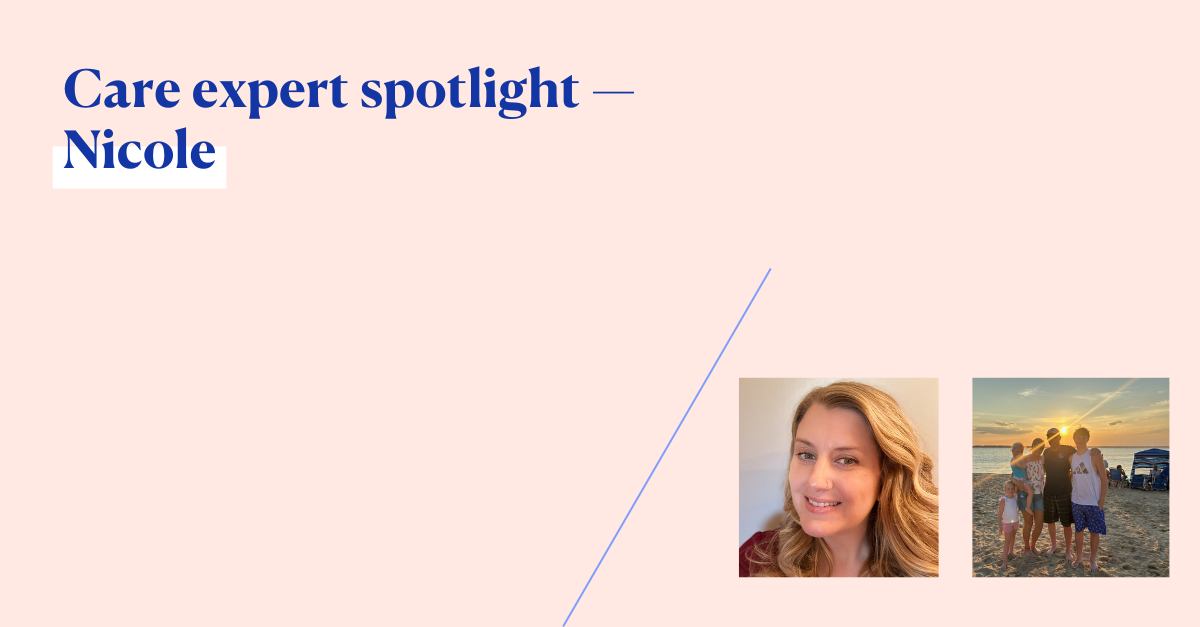With our Care Expert Spotlight series, we’re taking a peek into the lives of Wellthy's amazing care professionals.
This month we spoke with Nicole, a Backup Care Specialist with a background in working with children with special needs. Wellthy’s team of Backup Care Specialists works on urgent cases where a family needs to find last-minute support for a loved one due to an unforeseen circumstance such as a daycare suddenly closing or a nanny calling out sick.
What is your background in?
I am a Certified Nursing Assistant (CNA) and started my career working in nursing homes, long-term care facilities, and an Alzheimer’s unit. I shifted gears because I knew I really liked working with children and wanted to pursue that passion.
Before Wellthy, I worked at BAYADA Pediatrics where I cared for children with special needs. My full-time position was with a kiddo with cerebral palsy. So I worked in her home, just providing all aspects of daily care. She was a full body lift so I had to use a Hoyer lift for her and provide her personal care. I worked with another school-age kiddo with Down syndrome. I would go to school with her and assist her with assignments and needs during the school day.
What inspires you to work at Wellthy?
I came to Wellthy when the COVID-19 pandemic hit and schools shut down. Once schools shut down, a lot of parents didn’t want caregivers in their houses either, so demand for my support slowed.
I started on the Childcare Team, working on childcare and special needs tasks. In the last few months, I switched to our Backup Care Team, supporting urgent searches for daycare, nannies, and agencies. This role really checked a lot of boxes for me because I am still able to support children with special needs, just in a different way.
What is your personal caregiving story?
I provided care for my father who was an addict for my entire life. He passed away two years ago after undergoing a double leg amputation surgery which led to several complications.
Toward the end of his life, he refused to go to a nursing home and eventually passed at home with the support of hospice. Even though my father and I had our issues, my husband and I looked at it like, ‘He’s still a human,’ and helped where we could. But, there were a lot of times where what I tried didn’t work or he wasn’t willing to accept help.
What advice would you share with someone who’s new to caring for a loved one battling an addiction?
I would say that you can’t make them get the help if they don’t want the help. So, you could get them hospitalized, you could push for them to go to rehab. But unless they’re onboard with it and it, they are likely to come out of that intervention with the same issues. It’s really about the conversations you have with them and making sure they want the help you’re trying to give them.
Also, be prepared for a lot of pushback. You have to understand that they are still a person and they’re trying to fight that addiction. They don’t want to behave the way that they are a lot of times, but the addiction forces them to become someone else.
How does your background in working with children and special needs help you in your role at Wellthy?
Being able to point families in the right direction quickly. For example, with ABA therapy. I’ve worked with kiddos who have done ABA therapy, and some who never went to it. I’ve seen how much of a difference early intervention can help. In working with families dealing with a new autism diagnosis, I encourage them to get their kiddos in ABA therapy as early as possible.
The earlier that children have services like ABA therapy, the more successful they can be. For example, they may be non-verbal so they can’t speak, but they could get assistive devices like a tablet that they can press a button on to communicate what they want to say. This can eventually help them develop verbal speech and language skills as they get older.
Do you have a favorite moment from working with a member?
I worked on a task once where the goal was to find adoption agencies for a family. It stood out to me because it felt like I was doing something that was truly going to change somebody’s life – a family who really wanted children and couldn’t have them. I researched top adoption agencies in the United States, the top states to adopt from, and things like that.
I learned a lot about different US state adoption laws – some states you can adopt from out-of-state as an out-of-state resident, and others only let you adopt if you’re in-state. For this family, I compiled a list of the top states to adopt from based on their laws. For instance, do the biological parents have the right to ask for their child back years after the child was adopted? My work really made an impact on this family and their future.
When is a good time for a family caregiver to ask for help?
When you start realizing that all your time is being spent on that person – when you’re not spending time on yourself, not getting out of the house much. Maybe you realize it one day when you’re rushing home from work because you know that somebody at home needs you, or needs their meds, or needs dinner made. You begin to realize that day after day you’re doing the same routine and have no time to rest. If you hit that point, that’s the moment that you should reach out for help.
Also, if things start getting harder, reach out for help. For example, if the person you care for used to be able to get out of bed themselves and walk to the bathroom, but now they depend on you to do that and you’re up in the middle of the night doing it. That would be a good moment to say ‘Okay, maybe I could hire someone to come stay overnight so that I can get some sleep.’
To better prepare for the future, what steps can families with a child with special needs take today?
Early testing and getting involved in your local/regional centers once you have a diagnosis. There are so many resources available through your regional center. I see that a lot where families will open Care Projects for things like finding a summer camp for their child with special needs. One of my first questions is, ‘Do you receive services through your regional center?’ A lot of times they don’t and it’s a crucial first step to take. You also need to have a diagnosis for ABA therapy or insurance won’t pay for it.
As far as general childcare needs, plan early. Some waiting lists for daycares are 2+ years out, so plan early instead of waiting until the baby is born. Get on waitlists when your child is 2-3 months old for a good preschool.







